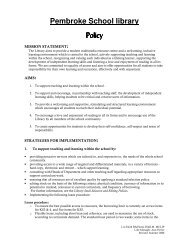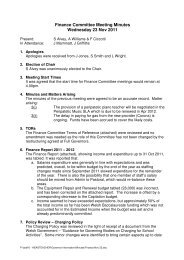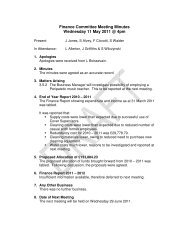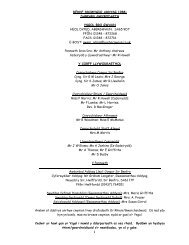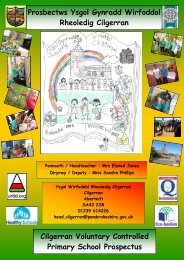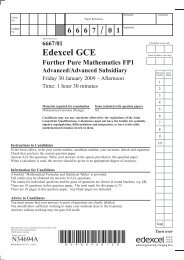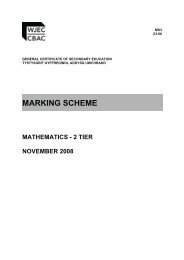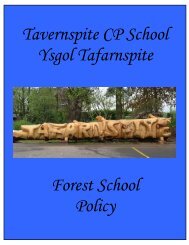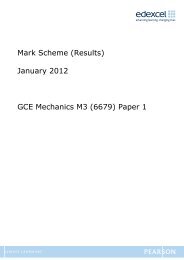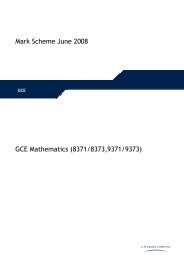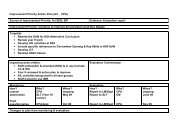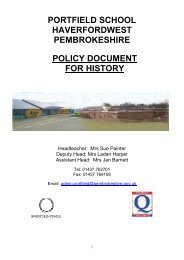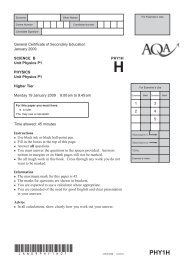Pembroke Dock Community School Prospectus 2010-2011 Proud to ...
Pembroke Dock Community School Prospectus 2010-2011 Proud to ...
Pembroke Dock Community School Prospectus 2010-2011 Proud to ...
Create successful ePaper yourself
Turn your PDF publications into a flip-book with our unique Google optimized e-Paper software.
Section C Pupil Guidance and Well-BeingSection D Extra Curricular ActivitiesSection E Useful Information <strong>Community</strong> Links Admissions Policy Equal Opportunities Policy Pupils with Disabilities <strong>School</strong> Meals Sporting Aims and Provision Use of Welsh Religious Education and Collective Worship Sex and Relationship Education Complaints Procedure <strong>School</strong> Security (for pupils, parents, visi<strong>to</strong>rs and staff) Parental Involvement2
SECTION APEMBROKE DOCK COMMUNITY SCHOOL<strong>Proud</strong> <strong>to</strong> be a <strong>Community</strong> <strong>School</strong>OUR MISSION STATEMENT<strong>Proud</strong> <strong>to</strong> be a <strong>Community</strong> <strong>School</strong> – striving for success for all!AwardsBasic Skills Quality Mark1 st Award – 20062 nd Award – 20083 rd Award – 2009<strong>Pembroke</strong>shire Health Promoting <strong>School</strong>s AwardPhase 1 – 2000Phase 2 – 2001Phase 3 – 2002Phase 4 – 2004Phase 5 - 2007NQA - 20093
PEMBROKE DOCK COMMUNITY SCHOOL<strong>Proud</strong> <strong>to</strong> be a <strong>Community</strong> <strong>School</strong><strong>Pembroke</strong> <strong>Dock</strong> <strong>Community</strong> <strong>School</strong>Bush Street<strong>Pembroke</strong> <strong>Dock</strong><strong>Pembroke</strong>shireSA72 6LQTelephone (01646) 684872FaxEmail head.pdcs@pembrokeshire.gov.ukAn English Medium <strong>Community</strong> <strong>School</strong>'Welcome'Dear Parents,Choosing the right school for your child is vitally important. Most parentswant a good education for their children but they also want them <strong>to</strong> be happyand <strong>to</strong> feel safe and secure. At <strong>Pembroke</strong> <strong>Dock</strong> <strong>Community</strong> <strong>School</strong> we believewe can offer all these things. We pride ourselves on the broad balanced andfull education we provide in all of our settings (Flying Start, Foundation Phase,our Autistic Centre and Key Stage 2) and the high standards of teaching andlearning are a credit <strong>to</strong> the hard work of both staff and pupils. Equally, we arealso proud of the atmosphere of friendliness and co-operation which is alwaysevident.Many visi<strong>to</strong>rs <strong>to</strong> our school comment on the warm welcome they receive andthe politeness and maturity of our pupils. The Inspection Report of <strong>2010</strong> notedthat 'pupils are motivated and keen <strong>to</strong> succeed', with pupils' behaviour beingdescribed as 'outstanding'.We do value our pupils and we believe that their time in school should berewarding and fulfilling. Should you choose <strong>to</strong> send your child <strong>to</strong> <strong>Pembroke</strong> <strong>Dock</strong><strong>Community</strong> <strong>School</strong> I am fully confident that you will have made the right decision.I look forward <strong>to</strong> meeting you soon and if you have any queries or concerns pleasecontact me at the school at any time.Yours sincerely,Michele ThomasHeadteacher5
SECTION BPEMBROKE DOCK COMMUNITY SCHOOL<strong>Proud</strong> <strong>to</strong> be a <strong>Community</strong> <strong>School</strong><strong>Pembroke</strong> <strong>Dock</strong> <strong>Community</strong> <strong>School</strong><strong>Pembroke</strong> <strong>Dock</strong> <strong>Community</strong> <strong>School</strong> opened on its present site in 2001. It is a modernand extremely well-resourced school, fully equipped, inside and outside, for teachingand learning in the 21 st century. We are an English medium primary school cateringfor children, their families and the wider community in <strong>Pembroke</strong> <strong>Dock</strong>.We are committed <strong>to</strong> providing the highest standard of education and pas<strong>to</strong>ral care <strong>to</strong>our children. They deserve the very best start in life and we aim <strong>to</strong> ensure that they aresupported and nurtured from the moment that they enter the school.Aims and ObjectivesThe school seeks: To create an atmosphere which aims <strong>to</strong> build the self esteem and personaldevelopment of everyone within the schoolThe school is committed <strong>to</strong> safeguarding and promoting the welfare of children andexpects all staff and volunteers <strong>to</strong> share this commitment6
PEMBROKE DOCK COMMUNITY SCHOOL<strong>Proud</strong> <strong>to</strong> be a <strong>Community</strong> <strong>School</strong>Term Dates <strong>2011</strong>Term Begin Half TermBeginSpring <strong>2011</strong>Summer <strong>2011</strong>Autumn <strong>2011</strong>Wednesday 5 thJanuary <strong>2011</strong>Tuesday 3 rd May<strong>2011</strong>Monday 5 thSeptember <strong>2011</strong>Monday 21 stFebruary <strong>2011</strong>Monday 30 th May<strong>2011</strong>Monday 24 thOc<strong>to</strong>ber <strong>2011</strong>Half TermEndFriday 25 thFebruary <strong>2011</strong>Friday 3 rd June<strong>2011</strong>Friday 28 thOc<strong>to</strong>ber <strong>2011</strong>EndFriday 15 th April<strong>2011</strong>Friday 15 th July<strong>2011</strong>Thursday 22 ndDecember <strong>2011</strong>Session TimesFlying Start and Early YearsMorning session 9.00am – 11.30amAfternoon session 12.30pm – 3.00pmYears 1 and 2Morning session 9.00am – 11.40amAfternoon session 12.40pm – 3.10pmYears 3 / 4Morning session 9.00am – 12.00pmAfternoon session 12.45pm – 3.15pmYears 5 / 6Morning session 9.00am – 12.15pmAfternoon session 1.00pm – 3.15pmA morning break of 20 minutes is taken by all pupils. An afternoon break of 15minutes is taken by pupils in the Early Years.<strong>School</strong> is open at 8am for Breakfast Club. This facility is free. If you are interestedin your child attending Breakfast Club on any day please ask for a registration form.Otherwise parents are advised that pupils who are not registered for Breakfast Clubwill be supervised thirty minutes prior <strong>to</strong> the start of the day and until 3.30pm at the7
end of each day.<strong>Pembroke</strong> <strong>Dock</strong> <strong>Community</strong> <strong>School</strong> Staff <strong>2010</strong>-<strong>2011</strong>HeadteacherMrs M.L. ThomasDeputy HeadteacherAssistant HeadteacherMrs. S. AinsworthMrs A. EdwardsSetting Lead Staff Support StaffAdditional Learning NeedsCoordina<strong>to</strong>rsMrs C. GriffithsMrs S. AinsworthFlying Start Miss S. Evans Mrs C.BensonMrs M. EvansMrs P. ThomasMiss A-M. JonesMrs D. GlassMrs M. Brace<strong>Dock</strong>leaf Nursery Mrs T. Edwards Mrs S. Ewings Mrs M. ProbertMrs S. Lloyd Mrs H. WilliamsMrs M. Hillier Miss S. CovelMrs S. Stan<strong>to</strong>n Mrs C. HuntMrs Q. JenkinsEarly Years (Full Time)Mrs D. Jones (Head of Early Years)Mrs J.Rawlings (Head of Part Time Nursery)Mrs S.SimsMiss C. VaughanYear 1 Miss K. Williamson /Mrs J. Vincent (Heads of Year 1)Miss L. EvansMrs G. HowellsMrs K. MorrisYear 2Miss R. McGrath (Head of Year2)Mrs A. MearMrs K..JamesYear 3 Mrs L. Prevel (Head of Year 3)Miss S. ButlerYear 4 Miss T. Lewis (Head of Year 4)Miss H. FieldingMr P. OkwedyYear 5Miss N. ChiffiMrs S. GaldoMrs K. ClarkeMiss S. Davies (Trainee Teacher)Year 6 Miss J. Thomas (Head of Year 6)Miss N. EllyattMr M. LlewellynAutistic CentreNurture ClassLibraryMrs S. Benbow (Head of Autistic Centre)Mrs J. HughesMiss N. GearyMrs H. AitchisonMrs L. Gould LibrarianMiss C. InceMrs A DewhurstMiss Z. BittleMiss N. ReesMrs S. McKeenMrs E. NevatteMrs P. ParcellMrs D. LewisMrs D. MarsdenMrs J. AsparassaMrs S. MasonMrs A. Hillier-WoodMrs E. HearneMrs I. JamesMrs C. HodgesMrs Z. Dut<strong>to</strong>nMrs D.KennifordMrs L. CallanMiss. Z. JonesMrs L.ThomasMrs J. PhillipsMrs R. NevatteMrs E. DaviesMrs I. JonesMrs L.Ash<strong>to</strong>nMrs D. JamesMr D. WrightMrs S.Thorne Mr J. Osbourne Mrs A. CresseyMrs N. Baker Mrs J. MorrisMrs D. Bell Mrs T. As<strong>to</strong>n Mrs K. BriggsMrs J. Uehlein Mrs S. Wellum Mrs A. KemberMrs. M Francis Mrs. Y Kingdom Mrs. S. LloydPPA (HLTA)Mrs J. AshmanMrs B. Evans8
Specialist Support Staff (HLTA)IT TechnicianAdministration ManagerAdministrative Reception staffSite ManagerClerical Meals SupervisorCatering ManagerSpringboardMrs M. GriffithsMrs S. ClarkeMr J.PerkinsMrs J. StampMrs M. JonesMr Leigh. LavilleMrs C. BarnikelMrs Tina ShanklinMs L. PhillipsMrs A. HarwoodLunchtime Supervisors:Mrs C. TownsendMrs S. BrinnMrs M. CherryMrs N. ColbeckMrs A. ColemanMrs J. GriffithMrs A. PhillipsMrs M. ScourfieldMrs W. ThomasGoverning Body <strong>2010</strong>/11Chair of GovernorsMr. P. BowenGarden CottageMil<strong>to</strong>n Terrace<strong>Pembroke</strong> <strong>Dock</strong>SA72 6BJClerk <strong>to</strong> the GovernorsMr. G. LongsterDirec<strong>to</strong>r of EducationEducation ServicesCounty HallHaverfordwest<strong>Pembroke</strong>shireSA61 1TP<strong>Pembroke</strong> <strong>Dock</strong> <strong>Community</strong> <strong>School</strong> Governing Body <strong>2010</strong>-<strong>2011</strong>Name Status Term of Office expiresMr R. John <strong>Community</strong> Governor 14/03/2014Mrs D. F. Turberville <strong>Community</strong> Governor 14/03/2014Mrs T. George <strong>Community</strong> Governor 02/11/2013Cllr. Mrs P. George <strong>Community</strong> Governor 05/10/2013Cllr. Mrs S. M. D. Perkins LEA Governor 15/11/2013Mrs G. Evans LEA Governor 13/06/2014Mr G. Callan LEA Governor 13/06/2014Mrs T. A. Mathias Parent Governor 27/03/2015Mrs A. E. Williams Parent Governor 20/01/2013Mrs L. N. Thomas Parent Governor 22/03/2013Mr D. G. Brown Parent Governor 31/12/<strong>2011</strong>Mrs J. Jacobs Parent Governor 10/10/<strong>2011</strong>Mrs A. J. Edwards Teacher Governor 17/06/2015Mrs J. Williams Teacher Governor 02/11/2013Mrs J. Ashman Staff Governor 01/07/20159
PEMBROKE DOCK COMMUNITY SCHOOL<strong>Proud</strong> <strong>to</strong> be a <strong>Community</strong> <strong>School</strong>How <strong>Pembroke</strong> <strong>Dock</strong> <strong>Community</strong> <strong>School</strong> is organisedWe are a large school and, as such, work hard <strong>to</strong> make every child feel special,nurtured and an individual. The school building is well-designed and, as such,children are based in wings that allow them <strong>to</strong> be learning and playing with their peergroups.Parent and Toddler GroupOur youngest group meet every Wednesday afternoon between 12.30-3pm. Theybenefit from the expertise of staff trained <strong>to</strong> deliver Language and Play (LAP) andNumber and Play (NAP) activities. Our nursery staff are also on hand as this is avaluable opportunity for us <strong>to</strong> get <strong>to</strong> know our future pupils and their families.Refreshments are served and there is plenty of opportunity <strong>to</strong> get <strong>to</strong> know otherparents and their children. These sessions are free.Flying Start (2 year olds)As part of a Welsh Assembly Government initiative, we are able <strong>to</strong> provide part timeplaces for two year old children. The children attend either five mornings a week orfor five afternoons a week. The staff: pupil ratio is 1:4, which allows our highlytrained specialist staff <strong>to</strong> work with the young children and provide a stimulatingenvironment, rich in language, social and play opportunities.Foundation Phase (3-7 year olds)<strong>Dock</strong>leaf NurseryWe have an extremely well resourced part timenursery setting where the staff:pupil ratio is 1:8,ensuring that all children's needs can be catered forand their introduction <strong>to</strong> the Foundation Phasecarefully planned and managed.Our outdoor nursery provision includes a range ofclimbing equipment, sand and water play, bicyclesand a garden that the children share responsibility10
for maintaining. Learning opportunities are planned for both indoors and outdoors,providing real contexts <strong>to</strong> support the children's understanding.All children can attend <strong>Dock</strong>leaf for two full days a week and for three additionalmornings. They increase <strong>to</strong> four full days and one morning by the time they are four.The children bring sandwiches on their full days,eating in their <strong>Dock</strong>leaf setting <strong>to</strong> avoid disruption<strong>to</strong> their routine.Early YearsThe children become full time the term after theyare four. We have three Reception classes andoperate on a staff:pupil ratio of 1:8. Children canstay for school dinners once they are full-time and also participate in our wide rangeof regular off-site visits. The children engage in practical learning activities <strong>to</strong> cementtheir understanding of key concepts.Years 1 and 2We have extremely well-resourced classrooms and staff who are highly trained in theprinciples of the Foundation Phase. The children haveopportunities <strong>to</strong> join lunchtime and after school clubs andclearly benefit from the staff: pupil ratio of 1:15.Additional support staff work with pupils <strong>to</strong> supportthem in any area deemed necessary <strong>to</strong> their well-being inschool. The skills-based curriculum ensures that childrenare actively engaged in their learning and can chart theirprogression of their skills.Key Stage 2 (7-11 year olds)With our emphasis on small class sizes weensure that our planning, teaching and levelsof support cater for the individual needs of allpupils. Staff ensure that their teaching appeals<strong>to</strong> all learner styles and is skills-based.Children are encouraged <strong>to</strong> take increasedresponsibility for their own learning. They areinvolved in the planning of their <strong>to</strong>pic basedwork and learn <strong>to</strong> refine their skills in both selfand peer assessment.<strong>School</strong> CurriculumThe school teaches according <strong>to</strong> the requirements of the revised National Curriculum2008. This curriculum focuses on the development of skills, and aims <strong>to</strong> providechildren with a positive attitude <strong>to</strong> education and a commitment <strong>to</strong> lifelong learning.Staff deliver a broad and balanced curriculum using a variety of teaching methods <strong>to</strong>deliver the curriculum <strong>to</strong> all pupils and <strong>to</strong> suit a range of learning styles. Teachers11
plan <strong>to</strong>gether, <strong>to</strong> ensure continuity, development and progression. There is anemphasis on developing Thinking skills, ICT skills, Communication skills andNumber skills.Schemes of Work for each area of the curriculumare carefully planned. Daily lesson plans ensureevery pupil is challenged through differentiatedactivities and learning outcomes. Work in abilitylinkedgroups is used whenever appropriate.Extension and enrichment work is provided <strong>to</strong>extend our pupils. All children are carefullymoni<strong>to</strong>red and assessed <strong>to</strong> ensure progress is beingmade. Staff encourage self and peer assessment andwork hard <strong>to</strong> ensure that children know where they are in their own learning and thenext step that they need <strong>to</strong> take in order <strong>to</strong> make progress.Pupils cover Foundation Phase Outcomes and Religious Education until the age of 7and then they study the National Curriculum and Religious Education. (Parents whowish <strong>to</strong> withdraw their children from Religious Education or assemblies shouldcontact the Headteacher).The Foundation Phase curriculum consists of three Core subjects: Language, Literacy& Communication, Mathematical Development and Personal & Social Development,Well-Being and Cultural Diversity.The Key Stage 2 curriculum consists of three Core subjects: English, Maths andScience.Both curricula consist of nine Foundation subjects: RE, Music, His<strong>to</strong>ry, Geography,Design and Technology, ICT, PE, Welsh (Second Language), Art and Design.Core SubjectsEnglishThe three components of English, Oracy, Reading and Writing,are an important focus in every subject area.Children are encouraged <strong>to</strong> express their thoughts, ideas andopinions in a variety of contexts and <strong>to</strong> a range of audiences. Weuse the process of s<strong>to</strong>ry telling <strong>to</strong> feed in<strong>to</strong> s<strong>to</strong>ry writing andhave found this <strong>to</strong> be a learning experience that is bothenriching and enjoyable.We have an extensive selection of fiction and non-fiction bookssuitable for all ages and interests. We use a range of strategies <strong>to</strong> support thedevelopment of children's reading skills e.g. phonic based programmes, guidedreading, paired reading, shared reading and also have a large number of support staffwho are trained <strong>to</strong> deliver Accelerated Literacy Leaning for children needingadditional support with their reading. Parents and carers are encouraged <strong>to</strong> read with12
their children for at least 10 minutes every evening.Children are provided with the opportunity <strong>to</strong> write for a range of purposes and formany different audiences across the curriculum. From the development of theiremergent writing skills <strong>to</strong> cursive writing, children are encouraged <strong>to</strong> see themselvesas writers and <strong>to</strong> use the skills covered through oracy and reading <strong>to</strong> produce writtenwork they are proud of. Alongside this we teach grammar, spelling and punctuation <strong>to</strong>ensure that our children have the necessary life skills for writing.MathematicsThe school currently follows the Carmarthenshire Scheme of Work, closely linked <strong>to</strong>the National Numeracy Strategy. The three main components of Mathematics areNumber, Shape, Space and Measure and DataHandling.Children are taught <strong>to</strong> solve 'real life'mathematical problems and <strong>to</strong> use these skillsacross all areas of the curriculum. We aim <strong>to</strong>ensure that our pupils have a soundunderstanding of the key mathematicalprinciples and can apply them withconfidence.Children are encouraged <strong>to</strong> learn theirmultiplication tables and <strong>to</strong> understand thedirect relationship between the four operations (addition, subtraction, multiplicationand division).Mathematics is taught in a practical context whenever possible with the use of a widerange of resources, including interactive mathematical activities. All staff are trainedin the use of Numicon, a highly effective mathematical resource.ScienceWe place a strong emphasis on both the acquisitionof skills in science and their application across therange of learning. The range of learning includesIndependence and Interdependence, The SustainableEarth, How things work – Electricity, Forces, Soundand Light. Pupils also have the opportunity for fieldwork across the county, at local farms, forests,waterways and beaches. Providing such a range ofstimulating learning contexts within Science serves<strong>to</strong> engage and enthuse our pupils.We ensure that other important elements such as PSE (Personal and SocialEducation), Curriculum Cymreig and ESDGC (Education for SustainableDevelopment and Global Citizenship) are included in an appropriate and relevantcontext across the curriculum.13
Habits of MindAn important aspect of our skills based curricula is the development of the16 Habitsof Mind. These habits are skills that are modelled by all effective people and willcontribute hugely <strong>to</strong> the development of your child's life skills.The Habits that we teach are:1.Persisting 2.Managing impulsivity 3.Listening with understanding & empathy4.Thinking flexibly 5.Thinking about your thinking 6.Striving for accuracy &precision 7.Questioning & problem posing 8.Applying past knowledge <strong>to</strong> newsituations 9.Thinking & communicating with clarity and precision 10.Gatheringdata through all senses 11.Creating, imagining & innovating 12.Responding withwonderment & awe 13.Taking responsible risks 14.Finding humour 15.Thinkinginterdependently 16. Remaining open <strong>to</strong> continuous learning.At the beginning of every term a letter is sent home outlining the <strong>to</strong>pic content that is<strong>to</strong> be covered during the term across all areas of the curriculum. If any parent wishes<strong>to</strong> have further details regarding any aspect of the curriculum please do not hesitate <strong>to</strong>contact Mrs Thomas.Healthy <strong>School</strong>, an Eco <strong>School</strong> and a Sustainable <strong>School</strong>As a member of the Welsh Network Healthy<strong>School</strong>s Schemes, a Platinum award-winning Eco<strong>School</strong> and Sustainable <strong>School</strong>s Gold Awardwinner, we aim <strong>to</strong>: Promote the self-esteem of all members ofthe school community Develop good relationships in the daily lifeof the school Identify, develop and communicate apositive ethos and appropriate social values within the school community Ensure that all pupils have the opportunity <strong>to</strong> benefit from stimulatingeducational challenges Take every opportunity <strong>to</strong> enhance the environment of the school Develop good school/home/community links and shared activities Encourage staff <strong>to</strong> fulfil their health-promoting role, through development andtraining Develop and implement a coherent health education curriculum Establish good links with associated schools <strong>to</strong> ensure smooth transition, bothsocially and in relation <strong>to</strong> a developmental health education programme Develop the school as a health-promoting workplace with a commitment <strong>to</strong> thehealth and well-being of all staff Develop the complementary role of all school policies <strong>to</strong> the health educationcurriculum, such that the curriculum reflects the content of the policy and thepolicy reinforces the curriculum14
Develop partnerships with appropriate outside agencies and individuals,including the school health service, for advice and active support for healtheducation and health promotion in the school Respect the school Eco Code, Eco <strong>School</strong>s and ESDGC visionSex and Relationship EducationThis area of the curriculum is delivered sensitively and with the support of the schoolnurse, Mrs Rachel Kersey. She regularly visits the school and has developed goodrelationships with pupils, staff and parents. During their final years in school, pupilsare provided with a greater depth of information relating <strong>to</strong> the development of theirbodies and the onset of adolescence. Parents will be informed as <strong>to</strong> when this willtake place and they have the right <strong>to</strong> withdraw their child if they do not wish them <strong>to</strong>receive this information. If you would like <strong>to</strong> see the materials being used for theselessons or if you would like a copy of the full policy please do not hesitate <strong>to</strong> ask forone.P.E. / Sporting Aims and ProvisionPhysical education is taught throughout the school by class teachers and allswimming is delivered by specialist instruc<strong>to</strong>rs at the <strong>Pembroke</strong> Leisure Centreswimming pool. We are fortunate enough <strong>to</strong> have a wealth of resources <strong>to</strong> support theteaching and learning and <strong>to</strong> provide opportunities for our pupils <strong>to</strong> participate in awide range of physical opportunities. This includes our most recent resource, atraverse wall, a huge success with bothpupils and staff!Our staff are trained <strong>to</strong> deliver PESS(Physical Education and <strong>School</strong> Sport), with<strong>Pembroke</strong> <strong>Dock</strong> <strong>Community</strong> <strong>School</strong> beingrecognised as a centre of excellence for ourcoverage of this programme.We place great emphasis on children'sdevelopment of their own physical skills aswell as the value of team games and learningthe skills necessary <strong>to</strong> be a team player.We encourage participation in competitive sport through our involvement in local,county and national <strong>to</strong>urnaments and inter- school matches, as well as our own sportsdays and swimming gala.Sport develops an awareness of the importance of health through exercise which linksin<strong>to</strong> our PSE programme and Healthy <strong>School</strong>s Project.MusicOne of our resources of which we are most proud is our fully equipped music room.All classes are timetabled <strong>to</strong> use the room and the instruments, recording equipmentand interactive resources on a weekly basis.Peripatetic staff come in<strong>to</strong> school <strong>to</strong> teach percussion, brass, string and woodwindinstruments <strong>to</strong> children from Years 4 and above15
Our choir is renown in the area and performs at anumber of concerts throughout the year.Children in the Foundation Phase and Key Stage 2maintain links with the local hospital and care homesand regularly visit them, or invite them <strong>to</strong> school, <strong>to</strong>share their musical talents. We encourage our pupils<strong>to</strong> play an active role in the community and <strong>to</strong> becomegood citizens.BilingualismStaff and pupils are encouraged <strong>to</strong> use Welsh as part oftheir everyday language in school. We aim <strong>to</strong> develop theuse of the language and <strong>to</strong> provide a relevant context forthe teaching of it. Much of the teaching is throughactivities and games, as well as reading and weekly diarywriting sessions in Welsh in Key Stage 2.Children are encourage <strong>to</strong> be proud of their Welshheritage and <strong>to</strong> respect the cultural identity of all childrenin school. We focus on our similarities and sharedbeliefs.R.E. and Collective WorshipFollowing statu<strong>to</strong>ry requirements all pupils attend a daily act of worship. All pupilsattend either Foundation Phase or Key Stage 2 Collective Worship, of a broadlyChristian nature. Pas<strong>to</strong>r Michael of Zion Chapel and Rev. Nigel Thomas, Vicar ofSt. John’s Church, visit the school regularly and lead our Collective Worship. MrsThomas and each class also lead assemblies. Parents are invited <strong>to</strong> join us when theirchild's class is leading the assembly. Dates are given out at the start of every term.Such opportunities contribute <strong>to</strong> pupils’ moral and spiritual development. It is also atime for us <strong>to</strong> acknowledge children's successes in and out of school and children areencouraged <strong>to</strong> share these with their class teachers in order that they can be includedin the assemblies.Parents have a right <strong>to</strong> withdraw their child from Collective Worship. Please discusswith the Headteacher your individual needs.ICT SuiteHousing sufficient computers and lap<strong>to</strong>ps for wholeclass use, dedicated and highly innovative ICT staffand up <strong>to</strong> the minute resources, our ICT suite providespupils with exciting opportunities <strong>to</strong> learn and developtheir ICT skills for use in the 21 st century.16
<strong>School</strong> LibraryWe are very fortunate <strong>to</strong> have a newly furnished and well s<strong>to</strong>cked school library, ledby a full time school librarian. Opened by the 'TwoSteves', a Welsh comedy teaching duo who specialise indelivering skills in reading , writing and oracy, thelibrary boasts a wide range of fiction and non-fictiontexts, comfortable furniture and brand new lap<strong>to</strong>ps.Children have the opportunity <strong>to</strong> gain skills inlibrarianship as well as regular timetabled sessions inthe library where their skills in research, skimming,scanning and reading for information are refined.Autistic CentreWe are proud of our Autistic Centre, a <strong>Pembroke</strong>shire County Council specialistprovision for pupils with autistic spectrumdisorder. It is located at the heart of the schooland provides an inclusive learning environmentfor its children. The children access the corecurriculum and these experiences are enhancedby a range of therapeutic activities, available inschool. These include developing sensoryawareness, Tai Chi and dance, play and musictherapy. A variety of off-site activities, such ashorse-riding and swimming are also provided. The children are able <strong>to</strong> makeeducational visits <strong>to</strong> support their learning and <strong>to</strong> enhance their understanding ofdifferent places and people.Staff in the Autistic Centre are highly trained and committed <strong>to</strong> an inclusive policyfor all children with special educational needs. The Centre has four bases, which areorganised with clearly defined areas for different activities, with each area having anintegral kitchen providing the children with opportunities <strong>to</strong> develop life-skills.Provision allows for children <strong>to</strong> use the bases,as appropriate <strong>to</strong> their individual needs.Pupils enjoy the use of a stimulating sensoryroom and a well-resourced soft play room. Aswith the rest of the school, the Centre has linkswith a number of visiting professionals, suchas the Speech and Language Therapist and theEducational Psychologist.A number of children who are admitted <strong>to</strong> theAutistic Centre are able <strong>to</strong> become based in amainstream class after a period of gradual integration. They are able <strong>to</strong> continue theiraccess <strong>to</strong> the facilities in the Centre.Admission is for children between 3 and 11 years of age. The Autistic Centre17
Admission Panel is the body that determines admission <strong>to</strong> the Centre. The pupils whoalready have a Statement of Special Educational Needs will gain admission via theadmission panel, subject <strong>to</strong> ratification of the placement by the <strong>Pembroke</strong>shireCounty Council's Inclusion Panel. <strong>Pembroke</strong> <strong>Dock</strong> <strong>Community</strong> <strong>School</strong> also offersdirect admission <strong>to</strong> mainstream classes for children with autism. This is alsodetermined by the County Council Inclusion Panel. Please contact the school forfurther information regarding the criteria for admission <strong>to</strong> our Autistic Centre.SEN PolicyOur SEN provision has been deemed as 'outstanding' (Estyn Report P.D.C.S.<strong>2010</strong>)and we are justifiably proud of the high levels of specialist support that we are able <strong>to</strong>provide.If the school feels that your child is having difficulty making expected progress with Learning skills Communication skills Behaviour, emotional or social skills Sensory/physical skillswe will provide extra resources and/or time and/or specific differentiated work <strong>to</strong> aidyour child’s progress. Your child is then said <strong>to</strong> be at the <strong>School</strong> Action Stage of theSpecial Needs Code of Practice. Your child may have additional programmes notedon his/her target sheet, which will be reviewed termly.If your child continues <strong>to</strong> require outside professional agency support or advice overa long period of time in order <strong>to</strong> meet individual needs, then the school, <strong>to</strong>gether withother professionals and yourself will meet <strong>to</strong> look at long-term targets. Your childwill then be said <strong>to</strong> be at the <strong>School</strong> Action Plus stage of the Code of Practice.If children continue <strong>to</strong> have significant problems, we will look <strong>to</strong> the authority foradvice which could require a formal assessment that may lead <strong>to</strong> a Statement ofEducational Need. Pupils with a Statement will have an annual review involvingthose professionals who have been involved with them along with parents andteachers.Parents will be consulted at all stages.All pupils are given an equal opportunity <strong>to</strong> access the curriculum and experience therange of opportunities on offer <strong>to</strong> them at the school.Pupils with DisabilitiesEvery effort is made <strong>to</strong> enable all pupils <strong>to</strong> play a full and active part in their time atschool. The school building has complete disabled access. Resources for specialprovision are reviewed regularly <strong>to</strong> maximise the inclusion of all children. Pleasecontact the Headteacher <strong>to</strong> discuss any specific needs or for a copy of the DisabilityEquality Scheme.18
More Able and TalentedA MAT Enrichment co-ordina<strong>to</strong>r works with classteachers <strong>to</strong> promote a wide range of activities for ourmost able children. Opportunities are promoted <strong>to</strong>meet the needs of all pupils regardless of emotional,social, linguistic, cultural, physical or intellectualdifferences, <strong>to</strong> extend their learning and their selfesteemthrough activities that both challenge andenthuse them. Research has proven that by improvingthe quality of learning and opportunities for more ableand talented pupils we raise standards of achievement for all pupils.We aim <strong>to</strong> provide an environment in which all our children are encouraged andsupported <strong>to</strong> achieve their maximum potential. We recognise that pupils havedifferent abilities, talents and learning needs andwe plan and organise the curriculum <strong>to</strong> meet theseand <strong>to</strong> raise standards for everyone.The term ‘More Able and Talented’ encompassesapproximately 20% of the school population andis used <strong>to</strong> describe pupils who require enrichedand extended opportunities across the curriculumin order <strong>to</strong> develop their abilities in one or moreareas. The <strong>to</strong>p 2% may be considered <strong>to</strong> beexceptionally able. Ability and talent may beshown in many different ways including academic, practical, creative, social, musicaland in sports.We offer pupils the opportunity <strong>to</strong> participate in the Buzzlings group in FoundationPhase and Buzz Club in Key Stage 2. Both provide enrichment opportunities for moreable and talented pupils <strong>to</strong> participate in local and county-wide events which extendthe range of challenges and experiencesavailable <strong>to</strong> them. The chance <strong>to</strong> meet andwork with new children of similar abilitiesprovides a further valuable learningopportunity.If your child has been identified at being moreable and talented and are on ourregister you will be informed so that we canwork in partnership <strong>to</strong> ensure your childreaches their full potential. If you are awareof any exceptional talent that your child has,please make it known <strong>to</strong> your child’s class teacher.Individual Pupil TargetsAll pupils have termly targets. These are short term targets which will include Maths,19
Literacy, ICT, a Habit of Mind and any other target applicable <strong>to</strong> the child's individualdevelopment. If a pupil needs specific additional learning needs programmes <strong>to</strong> assistthem achieving their targets these will also be noted on his/her target sheet. Pupilsare involved in drawing up targets and can add any of their own. Parents areinformed of them and are also invited <strong>to</strong> contribute <strong>to</strong> the Target Sheet. These arereviewed termly. These targets are child-friendly and SMART (specific, measurable,achievable, relevant and time-related).Pupil Profiles and ReportsAll staff at <strong>Pembroke</strong> <strong>Dock</strong> <strong>Community</strong> <strong>School</strong> work hard <strong>to</strong> ensure the continuousimprovement of the basic skills of all pupils in school. This includes those whounderachieve and those whose attainment is lower than would be expected ofsomeone of their age.This is achieved by regular assessment procedures which inform teachers and parentsof the children's academic progress. The results will also inform teachers' futureplanning in order <strong>to</strong> ensure that the individual needs of each child continue <strong>to</strong> be met.Assessment of Learning (Testing) Reading and spelling tests. All full time children are tested twice a year usingNFER Reading and Single Word Spelling tests All children are tested in maths twice a year using NFER maths tests All pupils are set half-termly BEAM targets in numeracy Assess and Review lessons at the end of each maths <strong>to</strong>pic All children undertake annual NVR tests (Non-Verbal Reasoning) Small skill or knowledge based tests e.g. spellings or mental maths tests arecarried out at the discretion of the class teacher. A rolling programme of assessment in the foundation subjects is established –results are recorded in the hard folders. End of Foundation Phase and Key Stage 2 assessments are carried out in Years2 and 6 in the core subjects as well as an assessment of each child's Personal &Social Development in the Foundation Phase.All test results are collated on<strong>to</strong> an individual tracking sheet. The information fromeach year group is recorded on a year group tracking sheet. This tracking informationis closely moni<strong>to</strong>red by staff and appropriate action is taken if a child is thought <strong>to</strong> beunder achieving.Parents of children in Years 2 and 6 will also receive a report on their child’sattainment at the end of Foundation Phase and Key Stage 2, with comparativeinformation of school children in <strong>Pembroke</strong>shire.Additional Learning NeedsAll staff are committed <strong>to</strong> a shared responsibility for the development of appropriatestrategies and systems of support in the delivery of provision made for pupils withadditional learning needs. The responsibility for ensuring supported integration for20
pupils with statements is with all staff.Inclusive and appropriate arrangements are made for pupils who have AdditionalLearning Needs.Learning Logs (Homework)In order <strong>to</strong> support the children's learning and thedevelopment of their independent learning skills,we provide exciting opportunities for them <strong>to</strong>continue their learning outside school. Our use ofLearning Logs ensures the development of thinkingskills, gives opportunities <strong>to</strong> develop creative skills,gives parents the chance <strong>to</strong> work with their childrenon their personal targets, takes account of differentlearning style preferences, allows pupils <strong>to</strong> present work in alternative ways andencourages their development of self and peer assessment skills.All children in Key Stage 2 and children in their final term of Year 2 will eachreceive a learning log. Every fortnight your child will be given a learning objective.It will be up <strong>to</strong> each child how <strong>to</strong> present their work, <strong>to</strong> show what they have learnedand unders<strong>to</strong>od about each objective. They can use pictures, writing, diagrams,labels, bullet points, mind maps, a PowerPointpresentation, a DVD, make a model, create a piece ofdrama or any style they choose <strong>to</strong> present their work.A return date will be set for when the log needs <strong>to</strong> comeback in<strong>to</strong> school. The logs will be reviewed in class bytheir peers and teachers at the end of each task. Therewill also be an area for you <strong>to</strong> record your comments ifyou wish <strong>to</strong> do so. We offer two study groups (Mondayand Wednesdays 3.30 - 4pm) for any pupil who wantssupport <strong>to</strong> prepare work in their learning log.If you wish <strong>to</strong> see how other schools use Learning Logssuccessfully you can take a look at the following website: www.learninglogs.co.ukTransfer of PupilsAt the end of Year 6, most children transfer <strong>to</strong> <strong>Pembroke</strong> <strong>School</strong>. There are stronglinks between staff from both schools and close liaison in order <strong>to</strong> achieve a seamlesstransition between schools for all pupils. During their final term in <strong>Pembroke</strong> <strong>Dock</strong><strong>Community</strong> <strong>School</strong>, children visit <strong>Pembroke</strong> <strong>School</strong> and spend a day with their newteachers. They also take part in transition projects, which are designed <strong>to</strong> furthersupport their move <strong>to</strong> the secondary school.21
SECTION CPEMBROKE DOCK COMMUNITY SCHOOL<strong>Proud</strong> <strong>to</strong> be a <strong>Community</strong> <strong>School</strong><strong>School</strong> EthosPositive Behaviour Policy''The behaviour of most pupils is outstanding. They are courteous (and) polite'(Estyn Report P.D.C.S. <strong>2010</strong>)Discipline and high standards of behaviour are very important within <strong>Pembroke</strong> <strong>Dock</strong><strong>Community</strong> <strong>School</strong>, where everyone is valued and respected. All members of theschool have a responsibility <strong>to</strong> encourage others <strong>to</strong> maintain high levels ofappropriate behaviour. We see the task of producing well-disciplined children as ajoint one, shared between parents, teachers and children. Pupils are encouraged <strong>to</strong>take responsibility for their own behaviour and they are expected <strong>to</strong> comply withacceptable standards of behaviour. The overall responsibility at school rests with theHeadteacher.Our emphasis is on the promotion of positive behaviour and current rewards includeMerit Points and 'Jewels in the Jar'. We share examples of exemplary behaviour withparents and encourage them <strong>to</strong> offer praise and reward <strong>to</strong> their children for suchbehaviour.We have a system of sanctions in place <strong>to</strong> deter unacceptable behaviour. Thesesanctions include advising parents of their children's unacceptable behaviour.Any form of bullying will be acted upon immediately and if necessary parents will beinformed.A disregard of acceptable standards of behaviour, especially when the health andsafety of other pupils is at risk, will result in pupils being excluded from school. This22
process involves the Governing Body as well as the LEA and follows strictprocedures.Pas<strong>to</strong>ral CarePas<strong>to</strong>ral care is very high on our agenda and all staff work hard <strong>to</strong> ensure that pupils'individual social progress and well-being needs are catered for.We have a number of specialist staff who are trained <strong>to</strong> deliver the curriculum alongnurturing principles and who are able <strong>to</strong> offer children additional support throughsmall group or individual counselling sessions in quiet surroundings. The use of thisvaluable facility will always be discussed with parents or carers first.Likewise we have excellent relationships with outside agencies who come in<strong>to</strong> school<strong>to</strong> provide additional support <strong>to</strong> children (e.g. behaviour, bereavement, co-ordination,speech & language).The Headteacher has the overall responsibility for the health, safety and security forthe school and the pupils. The school relies upon the close cooperation of allmembers of staff and parents <strong>to</strong> ensure that all pupils are cared for. The staff of theschool take responsibility for the children when they arrive at school in the morningand are on duty in the playground from 8.30am. Their responsibility continues untilthe children leave in the afternoon, with staff on duty outside until 3.30pm. Membersof staff and Lunchtime Supervisors are responsible for the children during lunchbreak.Children should always be clear as <strong>to</strong> arrangements for their getting home. If theyare being met by an adult other than the person who usually collects them school staffshould be informed of this, otherwise they will not release your child <strong>to</strong> an unknownwithout your express permission <strong>to</strong> do so.In cases of more serious accidents parents are requested <strong>to</strong> attend school. Ifunavailable then the Headteacher or senior member of staff would accompany a pupil<strong>to</strong> hospital if required and would stay with the pupil until the parent was available.It is important and in the best interest of all pupils that parents keep the schoolinformed about changes relating <strong>to</strong> addresses, telephone numbers, welfare of thepupils, home circumstances, illnesses and any medication being taken at home.From time <strong>to</strong> time accidents do occur; these are recorded and treated on the premises.Parents are always advised of a head injury by telephone. Letters are sent home <strong>to</strong>advise parents of any other treatment which has been administered.<strong>School</strong> Code of Conduct and Anti-Bullying PolicyIn conjunction with pupils, staff and governors, our <strong>School</strong> Council is in the processof drawing up a comprehensive set of standards for behaviour in our school. This willbe available by Easter <strong>2011</strong>.<strong>School</strong> Council<strong>Pembroke</strong> <strong>Dock</strong> <strong>Community</strong> <strong>School</strong> takes great pride in its dynamic <strong>School</strong> Council,made up of pupils from every year group in school. Annual secret ballot elections for<strong>School</strong> Council members are held each September, with one member from each23
class, from Year 1 <strong>to</strong> Year 6, being elected. Meetings are held every half term <strong>to</strong>discuss areas of concern and <strong>to</strong> voice pupilopinion. During Class Council, <strong>School</strong>Council members record issues for debate ordiscussion in their Class Council book. Theelected Chairperson, Vice Chairperson andSecretary draw up an agenda from this for the<strong>School</strong> Council meetings.<strong>School</strong> Council members write an Action Planat the beginning of each academic year inorder <strong>to</strong> identify their way forward for theforthcoming year and, as necessary, holdmeetings with the <strong>School</strong> Catering Manager, the Site Manager, Headteacher, <strong>School</strong>Link Governor and teaching staff <strong>to</strong> discuss the issues that have been raised. Pupilscan put forward suggestions for discussion at meetings in<strong>to</strong> the Listening Boxessituated in every classroom.The <strong>School</strong> Council provides an exciting opportunity <strong>to</strong> pupils across the school <strong>to</strong>practise skills such as working in a group, representing others and making importantchanges in the school community.Wrap Around CareWe offer the facility of wrap around care every week day between 8am – 6pm.<strong>School</strong> minibuses are also available <strong>to</strong> transport your child <strong>to</strong> and from school ifcertain criteria is met.Breakfast ClubWe offer an exciting start <strong>to</strong> every day through our Breakfast Club. This is a freefacility that only requires parents <strong>to</strong> initially register their children at the schoolReception desk. Children can arrive from 8am and will be given a healthy breakfastand the opportunity <strong>to</strong> take part in a range of activities with other children fromacross the school, under the guidance of enthusiastic staff who are committed <strong>to</strong>ensuring that the children are engaged and happy.After <strong>School</strong> ClubFrom 3.30 -6pm every day our After <strong>School</strong> Club offers the opportunity for children<strong>to</strong> access a wide selection of activities (including the ICT suite, cookery resourcesand indoor / outdoor sports equipment). A light tea is also provided. There is a smallcharge for this facility. Again, forms are available from the school Reception desk.In the interest of security, the school gates and the Early Years door are locked at9.00am. Please ensure all pupils arrive punctually in the morning. Any pupilsarriving late need <strong>to</strong> go <strong>to</strong> the main Reception area. Their names will be recorded asarriving late.Parents meeting their children at the end of the day should make their way <strong>to</strong> theoutside door of their child's class (except for children in Flying Start, whose parentsshould come in<strong>to</strong> school <strong>to</strong> collect them). It is very important that parents collect24
their children punctually at the end of the day at 3.30pm, as staff often have meetingsand extra curricular clubs after school and these need <strong>to</strong> start on time.It is important that as a school we are aware of any unforeseen difficulties that mayoccur in exceptional circumstances, which may delay the collection or delivery ofpupils <strong>to</strong> school. If ever the person collecting them is late, for whatever reason, thechildren are taken <strong>to</strong> After <strong>School</strong> Club. Please let us know when you are leavingwith your child.We run an After <strong>School</strong> Club after school until 6.00pm every evening. There is acharge for this facility. Please enquire at the office for information regardingavailability if you require this service.Attendance, Absences and Late ArrivalsIf pupils do not attend school, they cannot be educated. Good attendance andpunctuality leads <strong>to</strong> the best learning outcomes.We ask you <strong>to</strong> call the school on the first morning of absence, if possible before 9am.AbsenceIt is important <strong>to</strong> emphasise that there are two different types of absence, authorisedand unauthorised, and that unauthorised absence is perceived as truancy, and mayresult in the involvement of the Pupil Support Service. It is only the school who maydecide whether an absence is <strong>to</strong> be authorised or unauthorised. A letter does not initself authorise an absence, only the school’s acceptance of the explanation offered bythe letter authorises the absence.Absence from the school will be authorised by the school if it is for the followingreasons: sickness, unavoidable medical/dental appointments, days of religiousobservance, exceptional family circumstances, such as bereavement.Absence from school will not be authorised for the following reasons: shopping,haircuts, missed bus, slept late, birthdays.All medical/dental appointments should be made outside of school hours as far aspossible. Requests for holiday absence will be considered individually. THE LEAAND SCHOOL ACTIVELY DISCOURAGE PARENTS FROM TAKINGCHILDREN ON HOLIDAY DURING TERM TIME.PunctualityA pupil’s punctuality for school is a legal requirement. Pupils who are persistentlylate will be referred <strong>to</strong> the Pupil Support Officer <strong>to</strong> see if they can resolve anyproblems you may be experiencing.Average attendance for the year 2009/10 was __%. Unauthorised absences ___%.Authorised absences ___%. Our attendance target for 2009/10 was 90%. Currently25
outdoor situations.Other venues include local farms, nature reserves, our fabulous beaches, and parks.With three school minibuses, we are able <strong>to</strong>offer teaching and learning opportunities in arange of contexts which appeal <strong>to</strong> all our pupils.For off site visits or any outdoor use, wetweather gear is provided for all children inschool. This includes welling<strong>to</strong>n boots,waterproof jackets and trousers.Visits are arranged <strong>to</strong> link in with aspects of thecurriculum and <strong>to</strong> facilitate pupils’ involvementwith local schools and sporting events. Wherever possible we use visits <strong>to</strong> enrichchildren’s knowledge and understanding of <strong>to</strong>pics being studied.All visits follow a strict procedure and permission from parents is required. Theschool does not charge for any educational visits and activities that take place off theschool site but does, on occasion, ask parents for a voluntary contribution <strong>to</strong>wards thecost.There is a small charge for instrumental lessons - £1 per lesson or £25 per year.ValuablesWe discourage pupils from bringing valuable personal items <strong>to</strong> school. The use ofmobile telephones is not permitted during school hours. If pupils bring a mobilephone <strong>to</strong> school it must be handed <strong>to</strong> the class teacher for safe keeping.On the occasions when pupils bring money in<strong>to</strong> school, it should be placed in aclearly marked envelope with the child’s name, class and the amount recorded.Cheques for dinner money should be made payable <strong>to</strong> <strong>Pembroke</strong>shire CountyCouncil. Dinner Money can be given <strong>to</strong> the class teacher who will pass it <strong>to</strong> MrsBarnikel. Lunchtime snack money can be paid direct <strong>to</strong> the staff serving dinner asyour child collects their food.If preferred, dinner money and lunchtime snack money can be paid <strong>to</strong> Mrs Barnikeland a member of the kitchen staff who are available in the dining hall daily from 9-9.15am.<strong>School</strong> MealsOur school meals are cooked on the premises bySodexho. They offer excellent valuefor money and are highly nutritious. The menu issent home every term and includes a dailyselection of hot and cold choices as well as a28
daily pasta bar, jacket pota<strong>to</strong>es with a range of fillings and themed menus.All allergies and food in<strong>to</strong>lerances can be catered for. Please ensure that you informyour child's class teacher of any such issues and they will provide you with a form <strong>to</strong>complete for the school cook <strong>to</strong> be made aware of your child's specific needs.Families who think that they may be entitled <strong>to</strong> free meals may obtain relevantinformation and an application form from the main Reception desk. Staff areavailable <strong>to</strong> help with the completion of these forms and <strong>to</strong> send them off onyour behalf.Arrangements are made for children <strong>to</strong> eat packed lunches in the dining hall. Pleasenote that we encourage healthy eating.Break time snacks<strong>Pembroke</strong> <strong>Dock</strong> <strong>Community</strong> <strong>School</strong> was the first primary school in Wales <strong>to</strong> achievethe National Quality Award for the Welsh Network Healthy <strong>School</strong>s Scheme. Weencourage pupils <strong>to</strong> bring <strong>to</strong> school a piece of fruit or a vegetable <strong>to</strong> eat at breaktimes. No crisps, sweets, biscuits or other foods are permitted at break time.Smoothies and fruit may be purchased from the school fruit tuck shop that isorganised by the children.Every pupil has their own plastic drinking bottle that they may fill as required. Theyare accessible <strong>to</strong> children throughout the day.In addition, children in Flying Start and the Foundation Phase will be provided with asmall bottle of milk every day.Racial EqualityThe school is committed <strong>to</strong> promoting racial equality through the provision ofequality of opportunity and also through the building of good race relations betweenpeople of different racial groups. The school aims <strong>to</strong> meet the needs of pupils <strong>to</strong>ensure inclusion for all. We aim <strong>to</strong> ensure that all pupils are prepared for fullparticipation in a multi-ethnic society. This policy is available on request.29
SECTION DPEMBROKE DOCK COMMUNITY SCHOOL<strong>Proud</strong> <strong>to</strong> be a <strong>Community</strong> <strong>School</strong>Extra Curricular Activities'Provision for out of hours learning isexcellent with a wide range of after schoolclubs that are widely attended. These clubsare highly successful in raising pupils'aspirations and their self-confidence'.(Estyn Report P.D.C.S. <strong>2010</strong>)<strong>Pembroke</strong> <strong>Dock</strong> <strong>Community</strong> <strong>School</strong>promotes and encourages a range ofopportunities and activities which supportand extend learning and the development ofall children's interests and talents. We areregistered members of the Children’s University which allows formal recognition ofthe commitment young people make <strong>to</strong> these diverse activities.Extra curricular activities include: Media club Netball club Football Club Rugby/Cricket Club Dragon Sports clubs Welsh club Cross Country club IT club Choir Recorder club Tennis club Tech Explorers' club Craft Club Signalong Playground Games Board Games Reading Club Origami Club S<strong>to</strong>ry Telling ClubPupils will be advised each term of the clubs on offer.Pas<strong>to</strong>ral Care30
Pas<strong>to</strong>ral care is very high on our agenda and all staff work hard <strong>to</strong> ensure that pupils'individual social progress and well-being needs are catered for.The Headteacher has the overall responsibility for the health, safety and security forthe school and the pupils. The school relies upon the close cooperation of allmembers of staff and parents <strong>to</strong> ensure that all pupils are cared for. The staff of theschool take responsibility for the children when they arrive at school in the morningand are on duty in the playground from 8.30am. Their responsibility continues untilthe children leave in the afternoon, with staff on duty outside until 3.30pm. Membersof staff and Lunchtime Supervisors are responsible for the children during lunchbreak.Children should always be clear as <strong>to</strong> arrangements for their getting home. If theyare being met by an adult other than the person who usually collects them school staffshould be informed of this, otherwise they will not release your child <strong>to</strong> an unknownwithout your express permission <strong>to</strong> do so.In accordance with school policy, children are advised that they should come directlyback in<strong>to</strong> school if they were expecting <strong>to</strong> be met by an adult and that adult is notthere. We will then make a phone call home <strong>to</strong> confirm arrangements.From time <strong>to</strong> time accidents do occur; these are recorded and treated on the premises.Parents are always advised of a head injury by telephone. Letters are sent home <strong>to</strong>advise parents of any other treatment which has been administered.In cases of more serious accidents parents are requested <strong>to</strong> attend school. Ifunavailable then the Headteacher or senior member of staff would accompany a pupil<strong>to</strong> hospital if required and would stay with the pupil until the parent was available.It is important and in the best interest of all pupils that parents keep the schoolinformed about changes relating <strong>to</strong> addresses, telephone numbers, welfare of thepupils, home circumstances, illnesses and any medication being taken at home.Equal Opportunities PolicyRacial EqualityThe school is committed <strong>to</strong> promoting racial equality through the provision ofequality of opportunity and also through the building of good race relations betweenpeople of different racial groups. The school aims <strong>to</strong> meet the needs of pupils <strong>to</strong>ensure inclusion for all. We aim <strong>to</strong> ensure that all pupils are prepared for fullparticipation in a multi-ethnic society. This policy is available on request.Pupils with DisabilitiesEvery effort is made <strong>to</strong> enable all pupils <strong>to</strong> play a full and active part in their time atschool. The school building has complete disabled access. Resources for specialprovision are reviewed regularly <strong>to</strong> maximise the inclusion of all children. Pleasecontact the Headteacher <strong>to</strong> discuss any specific needs or for a copy of the DisabilityEquality Scheme.31
SECTION EPEMBROKE DOCK COMMUNITY SCHOOL<strong>Proud</strong> <strong>to</strong> be a <strong>Community</strong> <strong>School</strong><strong>Community</strong> LinksAs part of our on-going commitment <strong>to</strong> supporting life-long learning within the<strong>Pembroke</strong> <strong>Dock</strong> community, we are proud <strong>to</strong> be a vital part of both the <strong>Community</strong>First and Springboard projects that aim <strong>to</strong> help rejuvenate the opportunities forresidents of the <strong>to</strong>wn.We are extremely proud of our strong links with the local community. We arecommitted <strong>to</strong> lifelong learning and support all pupils, parents and staff in theirpersonal development.<strong>Community</strong> Learning ClassesCommunities First and Springboard deliver a wide range of classes for parents andother members of the local community on a daily basis. The classes change termlyand parents are kept fully informed of the opportunities available <strong>to</strong> them. Currentclasses include English, Maths, Welsh, English as a Second Language, Ceramics,Hairdressing and Beauty, Face-Painting, Woodwork and Jewellery making. Theseclasses are free and all are welcome.NVQ / Cache TrainingProvision also exists for members of the community <strong>to</strong> work <strong>to</strong>wards achievingNational Vocational Qualifications (Levels 1, 2 and 3) in Childcare and Developmentand Supporting Teaching and Learning in the classroom. These qualifications aregranted by <strong>Pembroke</strong>shire College. Induction and all training is delivered in school.Trainees are expected <strong>to</strong> work for two days per week in school and support isprovided in the completion of each of the modules. An assessor from <strong>Pembroke</strong>shireCollege visits trainees regularly <strong>to</strong> moni<strong>to</strong>r their performance and assess their work.Mrs Sue Ainsworth, deputy headteacher, is the link between school and<strong>Pembroke</strong>shire College.Additional opportunities for NVQ/ Cache qualifications , such as I.T. And Cus<strong>to</strong>merCare, are available through PRP and placement at <strong>Pembroke</strong> <strong>Dock</strong> <strong>Community</strong><strong>School</strong>.AdmissionsAdmission Policy32
<strong>Pembroke</strong> <strong>Dock</strong> <strong>Community</strong> <strong>School</strong> caters for children from ages 3 – 11The Admission Policy is determined by the LEA.PEMBROKESHIRE COUNTY COUNCIL<strong>School</strong> Admission Arrangements for <strong>2010</strong>/<strong>2011</strong>The following arrangements are proposed for admissions <strong>to</strong> <strong>Community</strong> and Voluntary Controlled<strong>School</strong>s in <strong>Pembroke</strong>shire for the <strong>2010</strong>/<strong>2011</strong> academic year.1. Admissions Policya) The local authority is the admissions authority, except in Voluntary Aided schools where thegoverning body is the admission authority.b) Parents may express a preference for a school and the admission authority must meet thatpreference unless <strong>to</strong> do so would prejudice the provision of efficient education or theefficient use of resources. If there are the room and resources in the school the place will beprovided. All prospective parents should express a preference in writing .c) Places will be allocated up <strong>to</strong> the school’s admission number without application of anyconditions. However, should the number of applications exceed the admission number, thefollowing oversubscription criteria, listed in priority order, will be used <strong>to</strong> allocate places:- pupils residing in the area which the school normally serves (known as the catchment area)- pupils attending feeder schools- pupils with a sibling in the school at the time of admission- specific medical and social reasons appertaining <strong>to</strong> the prospective pupil.In the event of a tie, a place will be offered <strong>to</strong> the pupil who lives nearest <strong>to</strong> the school,measured by the shortest walking distance between the nearest school gate and the point wherethe pupil’s dwelling meets the public highway.2 Admission Number and CapacityNew regulations have been issued concerning admission arrangements and the method of assessingthe capacity and admission numbers for schools. Admission numbers for <strong>2010</strong>/11 are based on thenew regulations and relate directly <strong>to</strong> the school’s capacity. Admission numbers for <strong>Pembroke</strong>shireschools for <strong>2010</strong>/11 are appended.3. <strong>School</strong> Admission DatesThe Government has set dates by which children must attain the age of five <strong>to</strong> be of compulsoryschool age in the following school term. These dates are 31st August, 31st December and 31stMarch. Pupils who have attained the age of 4 on or before these dates may be admitted <strong>to</strong> full timeeducation the following term. Children may be admitted <strong>to</strong> primary school in September, January orApril depending on their date of birth. Many schools are also able <strong>to</strong> admit 3 year old pupils <strong>to</strong> parttime early years education and the eligibility dates also apply <strong>to</strong> these admissions.4. Deadline for Receipt of Primary Admission ApplicationsThe deadline for receipt of applications for admissions <strong>to</strong> primary schools in January, April orSeptember <strong>2011</strong> will be ____. Applications for admission during the <strong>2011</strong> calendar year will berequired by _______. Admissions will take place termly.All applications received for a particular school are considered <strong>to</strong>gether following the deadline. Inthe event of oversubscription, the criteria shown in paragraph 1 c) above are applied.33
5. Transfer from Early Years Units <strong>to</strong> Mainstream <strong>School</strong>Where a child attends an Early Years Unit, transfer in<strong>to</strong> mainstream school at statu<strong>to</strong>ry school age isnot au<strong>to</strong>matic. An application form should be submitted by the appropriate deadline forconsideration with other expressions of preference received. The admission criteria will be appliedif there are more applications than places available.6. Admissions <strong>to</strong> Junior <strong>School</strong>sWhere there are separate infant and junior schools, parents should make a formal application for aplace at the junior school. The oversubscription criteria will be applied if there are moreapplications than places available.7. Admissions <strong>to</strong> Secondary <strong>School</strong>sParents of year 6 pupils are invited <strong>to</strong> express their preference for a secondary school at thebeginning of the calendar year in which the pupil is due <strong>to</strong> transfer. Forms are distributed andreturned via the primary school. The deadline for receipt of applications is published in the <strong>School</strong>sin <strong>Pembroke</strong>shire information booklet. The allocation of secondary school places takes place beforeEaster.8. Admissions <strong>to</strong> Portfield <strong>School</strong> and SEN attached UnitsAdmissions <strong>to</strong> Portfield Special <strong>School</strong> and designated special needs attached units at mainstreamschools are dealt with by the Authority’s Special Needs Service on the basis of need. The criteriashown above do not apply.9. Transfer Between <strong>School</strong>sParents may request a transfer at any time. Unless the transfer is due <strong>to</strong> a change of address, theauthority will normally allow transfer from one <strong>Pembroke</strong>shire school <strong>to</strong> another only at thebeginning of term. In the first instance, parents are directed <strong>to</strong> the Headteacher of the currentschool <strong>to</strong> discuss the situation. If the parent wishes <strong>to</strong> pursue the transfer then they are required <strong>to</strong>submit the request in writing <strong>to</strong> the Direc<strong>to</strong>r of Education and Children’s Services and a pro<strong>to</strong>colinvolving the Pupil Support Service is applied. It is not permissible for parents <strong>to</strong> be interviewed bythe school or the admissions authority at any stage in the admissions process. Parents are, however,invited <strong>to</strong> discuss transfers with an officer of the Authority. A guidance leaflet for parents seeking <strong>to</strong>transfer their child is available from the school or the Admissions Officer and online atwww.pembrokeshire.gov.uk.10. Deferred EntryParents may apply for a school place for a child who is not of compulsory school age (5) and theadmissions authority, at the request of the parent, may agree <strong>to</strong> the child deferring entry <strong>to</strong> thereception class until he/she is of compulsory school age. The effect of this is that the place is heldfor that child and is not available for another child.11. AppealsIf there are appeals against admissions decisions they will be heard by an independent appeals panelappointed by <strong>Pembroke</strong>shire County Council. Letters of appeal should be sent by parents <strong>to</strong> theDirec<strong>to</strong>r of Education and Children’s Services within 10 working days of the date of notificationthat an application for a place was unsuccessful.12. Admission ForumThe <strong>Pembroke</strong>shire Admission Forum meets twice a year <strong>to</strong> discuss local admission issues. Headteachers, governors, parents and diocesan authorities are represented. Terms of reference andminutes of forum meetings are published online at www.pembrokeshire.gov.uk34
<strong>Pembroke</strong>shire County Council<strong>Pembroke</strong>shire County CouncilCyngor Sir PenfroAPPLICATION FOR ADMISSION TO SCHOOLWhere more than one person has parental responsibility for a child, the person completing this application isasked <strong>to</strong> agree the preferred school with others with parental responsibility, where their whereabouts areknown, before submitting the form.Legal Name of Pupil : Surname _______________________________________Forenames _______________________________________Name(s) by which child is known if different from above ____________________________Date of Birth: __________________ Age _______________________Address of Pupil: ____________________________________________________________________________________________________________________________________Post Code:_________Names of Parents __________________________________________________Parents address(es) ____________________________________________________________________________________________________________________________________Post Code:_________Telephone No : Home_________________ ____Work________________ ________Mobile_________________ ____Email address: __________________________________________________Term and Year for which the place is requested : ______________________________<strong>School</strong> attended (if any): __________________________________________________Name of preferred school for which admission application is being made:<strong>Pembroke</strong> <strong>Dock</strong> <strong>Community</strong> <strong>School</strong>Reasons for preference____________________________________________________________________________________________________________________________________________________________________________________________________________________________________________________________________________________________________You may continue on a separate sheet if necessary35
Please state name(s) and date(s) of birth of any sibling(s) attending the preferred school:__________________________________________________________________________________________________________________________________________________NB If preference is expressed for a school other than the catchment school or thenearest school, responsibility for transport lies with the parents.You are invited <strong>to</strong> state below if your child has any individual requirements or disabilities which may affecthis/her education or school attendance. (Please note that your child’s admission <strong>to</strong> school may be delayed ifyour application contains serious errors or omission or fails <strong>to</strong> disclose relevant information).________________________________________________________________________You may continue on a separate sheet if necessaryDoes your child have a Statement of Special Educational Needs? YES NOIf YES, please state Local Authority which wrote the Statement and provide contact nameand telephone number______________________________________________________________________________________________________________________________You may continue on a separate sheet if necessaryIs the child ‘looked after’ (i.e. in the care of social services)? YES NOIf YES, who is the named social worker and responsible Local Authority?Social worker _________________________ Telephone number ____________________Local Authority____________________________________________________________Signature of parent____________________________________ Date : ______________NB All applications for first admission between _____ must be submitted by _____ If you are applying for apart-time school place please include a pho<strong>to</strong>copy of your child’s birth certificate.Return this form <strong>to</strong> the head teacher of the school or <strong>to</strong> Admissions Officer,<strong>Pembroke</strong>shire Education Services, County Hall, Haverfordwest SA61 1TPApplications made on other Local Authorities’ forms will be acceptedDATA PROTECTION ACT 1998The information which you provide on this form will be used for the administration of schooladmissions/transfers, school health service and statistical moni<strong>to</strong>ring purposes only. <strong>Pembroke</strong>shire CountyCouncil is registered under the Data Protection Act 1998.36
Fair Processing InformationFair Processing Notice: What the <strong>School</strong>, Local Education Authority and Government does withInformation it holds on PupilsSubjectTo meet the requirements of the Data Protection Act 1998, schools are required <strong>to</strong> issue a Fair Processing Notice <strong>to</strong>pupils and/or parents summarising the information held on record about pupils, why it is held, and the third parties <strong>to</strong>whom it may be passed on.This Fair Processing Notice provides information about the collection and processing of pupils’ personal andperformance information by the Welsh Assembly Government, <strong>Pembroke</strong>shire Local Education Authority (LEA) and<strong>Pembroke</strong> <strong>Dock</strong> <strong>Community</strong> <strong>School</strong>.The collection of personal informationThe school collects information about pupils and their parents or legal guardians when they enrol at the school. Theschools also collect information at other key times during the school year. Information is also received from otherschools when pupils transfer.The <strong>School</strong> processes the information it collects <strong>to</strong> administer the education it provides <strong>to</strong> pupils. For example: the provision of educational services <strong>to</strong> individuals; moni<strong>to</strong>ring and reporting on pupils’ educational progress; the provision of welfare, pas<strong>to</strong>ral care and health services; the giving of support and guidance <strong>to</strong> pupils, their parents and legal guardians; the organisation of educational events and trips; planning and management of the school.Welsh Assembly Government (WAG) & Local Education Authority (LEA)The Welsh Assembly Government receives information on pupils normally as part of what is called the Pupil LevelAnnual <strong>School</strong>s Census (PLASC). The Welsh Assembly Government uses this personal information for research(carried out in such a way that ensures individual pupils cannot be identified) and for statistical purposes, <strong>to</strong> inform,influence and improve education policy and <strong>to</strong> moni<strong>to</strong>r the performance of the education service as a whole. Examplesof the sort of statistics produced can be viewed at www.wales.gov.uk/statistics and www.npd-wales.gov.ukThe LEA also uses the personal information collected via PLASC <strong>to</strong> do research. It uses the results of this research <strong>to</strong>make decisions on policy and the funding of schools, <strong>to</strong> calculate the performance of schools and help them <strong>to</strong> settargets. The research is carried out in such a way that ensures individual pupils cannot be identified.In addition WAG and LEAs receive information regarding National Curriculum assessment and Public Examinationresults and attendance data at pupil level.Personal information heldThe sort of personal information that will be held includes; personal details such as name, address, date of birth, pupil identifiers and contact details for parents andguardians; information on performance in internal and national assessments and examinations; information on the ethnic origin and national identity of pupils (this is used only <strong>to</strong> prepare summary statisticalanalyses); details about pupils’ immigration status (this is used only <strong>to</strong> prepare summary statistical analyses);37
medical information needed <strong>to</strong> keep pupils safe while in the care of the school;information on attendance and any disciplinary action taken;information about the involvement of social services with individual pupils where this is needed for the care ofthe pupil.Organisations who may share personal informationInformation held by the <strong>School</strong>, LEA and the Welsh Assembly Government on pupils, their parents or legal guardiansmay also be shared with other organisations when the law allows, for example with; other education and training bodies, including schools, when pupils are applying for courses, training, schooltransfer or seeking guidance on opportunities; bodies doing research for the Welsh Assembly Government, LEA and schools, so long as steps are taken <strong>to</strong> keep theinformation secure; central and local government for the planning and provision of educational services; social services and other health and welfare organisations where there is a need <strong>to</strong> share information <strong>to</strong> protect andsupport individual pupils; various regula<strong>to</strong>ry bodies, such as ombudsmen and inspection authorities, where the law requires that informationbe passed on so that they can do their work.Pupils have certain rights under the Data Protection Act, including a general right <strong>to</strong> be given access <strong>to</strong> personal dataheld about them by any “data controller”. The presumption is that by the age of 12 a child has sufficient maturity <strong>to</strong>understand their rights and <strong>to</strong> make an access request themselves if they wish. A parent would normally be expected <strong>to</strong>make a request of child’s behalf if the child is younger.If you wish <strong>to</strong> access your personal data, or that of your child, then please contact the relevant organisation in writing.Other informationThe Welsh Assembly Government, LEA and school place a high value on the importance of information security andhave a number of procedures in place <strong>to</strong> minimise the possibility of a compromise in data security.The Welsh Assembly Government, LEA and <strong>School</strong> will endeavour <strong>to</strong> ensure that information is kept accurate at alltimes. Personal information will not be sent outside the United Kingdom.Your rights under the Data Protection Act 1998The Data Protection Act 1998 gives individuals certain rights in respect of personal information held on them by anyorganisation. These rights include; the right <strong>to</strong> ask for and receive copies of the personal information held on you, although some information cansometimes be legitimately withheld; the right, in some circumstances, <strong>to</strong> prevent the processing of personal information if doing so will cause damage ordistress; the right <strong>to</strong> ask for wrong information <strong>to</strong> be put right; the right <strong>to</strong> seek compensation if an organisation does not comply with the Data Protection Act 1998 and youperson suffer damage; in some circumstances a pupil’s parent or legal guardian may have a right <strong>to</strong> receive a copy of personal data heldabout a pupil in their legal care. Such cases will be considered on an individual basis where the individual isdeemed <strong>to</strong> have insufficient understanding of their rights under the Act.You also have the right <strong>to</strong> ask the Information Commissioner, who enforces and oversees the Data Protection Act 1998,<strong>to</strong> assess whether or not the processing of personal information is likely <strong>to</strong> comply with the provisions of the Act.Seeking further informationFor further information about the personal information collected and its’ use, if you have concerns about the accuracy ofpersonal information, or wish <strong>to</strong> exercise your rights under the Data Protection Act 1998, you should contact; your child’s school on 01437 765480; your LEA on 01437 775502;the Welsh Assembly Government’s data protection officer at, The Welsh Assembly Government, Cathays Park, Cardiff,CF10 3NQ; the Information Commissioner’s office help line can be contacted on 01625 545 745; information is also available from www.ico.gov.ukComplaints Procedure38
If parents or carers have any concerns regarding their child in school, they are asked<strong>to</strong> contact the class teacher or Mrs Thomas. It is important that we are fully aware ofindividual concerns so that we can address them immediately. We will be only <strong>to</strong>opleased <strong>to</strong> answer any of your questions or assist you in any way.Should you wish <strong>to</strong> make a formal complaint, relating <strong>to</strong> the curriculum or any othermatter, there is a complaints procedure, which is set out by <strong>Pembroke</strong>shire CountyCouncil. This begins with the complaint first being lodged with the Headteacher,who will arrange for a discussion <strong>to</strong> take place. It the matter is not resolved, theHeadteacher will then advise on the next step of the complaints procedure.The full complaints procedure policy can be found on the <strong>Pembroke</strong>shire e-portal.Friends of <strong>Pembroke</strong> <strong>Dock</strong> <strong>Community</strong> <strong>School</strong>We are very fortunate <strong>to</strong> have a supportive group of parents working for the good ofthe school. Under the direction of Mrs Delyth Jones, our Head of Early Years, the‘Friends’ meet during the term <strong>to</strong> plan and promote events, which will provideexciting additional experiences for our children and raise funds for the school. Aschildren enrol in school, their parents au<strong>to</strong>matically become ‘Friends of <strong>Pembroke</strong><strong>Dock</strong> <strong>Community</strong> <strong>School</strong>’. All parents are welcome <strong>to</strong> meetings and we are alwaysgrateful for new suggestions and ideas.Parental Involvement in <strong>School</strong> LifeParents and carers are encouraged <strong>to</strong> take an active and supportive interest in theirchild’s school life. They are also invited <strong>to</strong> attend meetings or request meetings <strong>to</strong>discuss the progress of their child with the class teacher or with the Headteacher atany time.There will be two main parent evenings a year. Written reports will be handed outduring the end of the Summer Term, before the summer parents’ evening.39
SECTION FPEMBROKE DOCK COMMUNITY SCHOOLStatistical InformationAttendance data<strong>Proud</strong> <strong>to</strong> be a <strong>Community</strong> <strong>School</strong>Foundation Phase and Key Stage 2 National Curriculum Assessment DataNational (All Wales) Comparative Assessment ResultsNational (All Wales) Comparative Examination Results40




